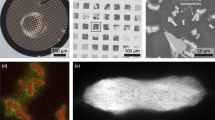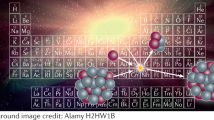Abstract
IN our letter of February 9, which appeared in NATURE of February 24, p. 252, we have shown that the element hafnium, of atomic number 72, detected by us in zirconium minerals, possesses physical and chemical properties quite different from those ascribed to a rare earth element celtium, the discovery of which was announced by Urbain in 1911, and which recently was believed by Dauvillier and Urbain also to possess the atomic number 72. In a communication of February 19 to the Paris Academy of Sciences (Comptes rendus, vol. 176, p. 496, 1923) Urbain discusses the same problem and still claims the identity of his celtium with our hafnium and by a claim of priority rejects the latter name. In the meantime, through the investigation of Hansen and Werner (see NATURE of March 10, p. 322, and the above letter in this issue) on the optical spectrum of hafnium and on the spectrum ascribed by Urbain to celtium, new data have been brought to light, and we should therefore be glad to take the opportunity to complete our arguments as regards the questions discussed by Urbain.
This is a preview of subscription content, access via your institution
Access options
Subscribe to this journal
Receive 51 print issues and online access
$199.00 per year
only $3.90 per issue
Buy this article
- Purchase on Springer Link
- Instant access to full article PDF
Prices may be subject to local taxes which are calculated during checkout
Similar content being viewed by others
Author information
Authors and Affiliations
Rights and permissions
About this article
Cite this article
COSTER, D., HEVESY, G. On Celtium and Hafnium. Nature 111, 462–463 (1923). https://doi.org/10.1038/111462a0
Issue Date:
DOI: https://doi.org/10.1038/111462a0
This article is cited by
Comments
By submitting a comment you agree to abide by our Terms and Community Guidelines. If you find something abusive or that does not comply with our terms or guidelines please flag it as inappropriate.



